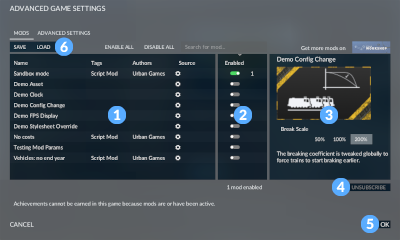

Mod Organizer 2 itself gets the nod here, and while Steam Workshop is good here, it is ultimately not as good as Mod Organizer 2’s complete isolation.Īs you can see, there is no clear winner. But you can download mods from here manually, and then manage them with Mod Organizer 2. ModDB is just a website, so it cannot do any of this on its own. Mod Organizer 2 installs mods in a completely separate directory, so you can run the unmodded game alongside modded game profiles (you cannot do this with Workshop), and you can’t technically break your game with mods when using Mod Organizer 2 because of this. Nexus Mods + Mod Organizer 2 is excellent in this category too. If a mod breaks a game, you can just unsubscribe from that mod and your game will be just fine again. Winner: Mod Organizer 2 and using it to manage mods through Nexus Mods or manually from ModDB/elsewhereĭue to the simplicity of Steam Workshop’s automation, it functions well in this category. Mod Organizer 2 detects conflicts right away, making it the clear winner here. It is useful for resolving mod/file conflicts and guiding you through the process while being very verbose. It can connect to Nexus Mods on its own, though you can use it with mods downloaded from ModDB elsewhere too. But if you want specifics on conflicting files, you are pretty much helpless due to Workshop’s lack of transparency. But you can at least easily unsubscribe from a mod to try and narrow down the compatibility issue (most games also let you enable/disable Workshop subscribed mods which is even easier). This combined with the lack of transparency which disallows you from seeing what exact files are being downloaded makes conflict resolution even more inconvenient. Steam Workshop, despite its automation, also has no such mechanisms. ModDB on the other hand is a completely manual process, which some people will actually prefer especially for any game where you want a version freeze on some mods (although Nexus is good for this too). Mod Organizer 2 also automatically detects conflicting files while Steam Workshop and ModDB don’t do this, but more on this later. It also does not need to be used with Nexus Mods, but doing so is convenient since there’s an integration for it.

The tool needs to support the game in question, and for supported games you can have the tool install/uninstall mods for you, and update mods as well. Another tool is needed to automatically install and remove mods there are several options out there, but Mod Organizer 2 is generally agreed upon as being the best. Workshop mods are updated automatically on their own through Steam.Īutomation is a bit more limited with Nexus Mods, but still present. Select unsubscribe and it automatically uninstalls. Select subscribe and the mod automatically installs.


 0 kommentar(er)
0 kommentar(er)
